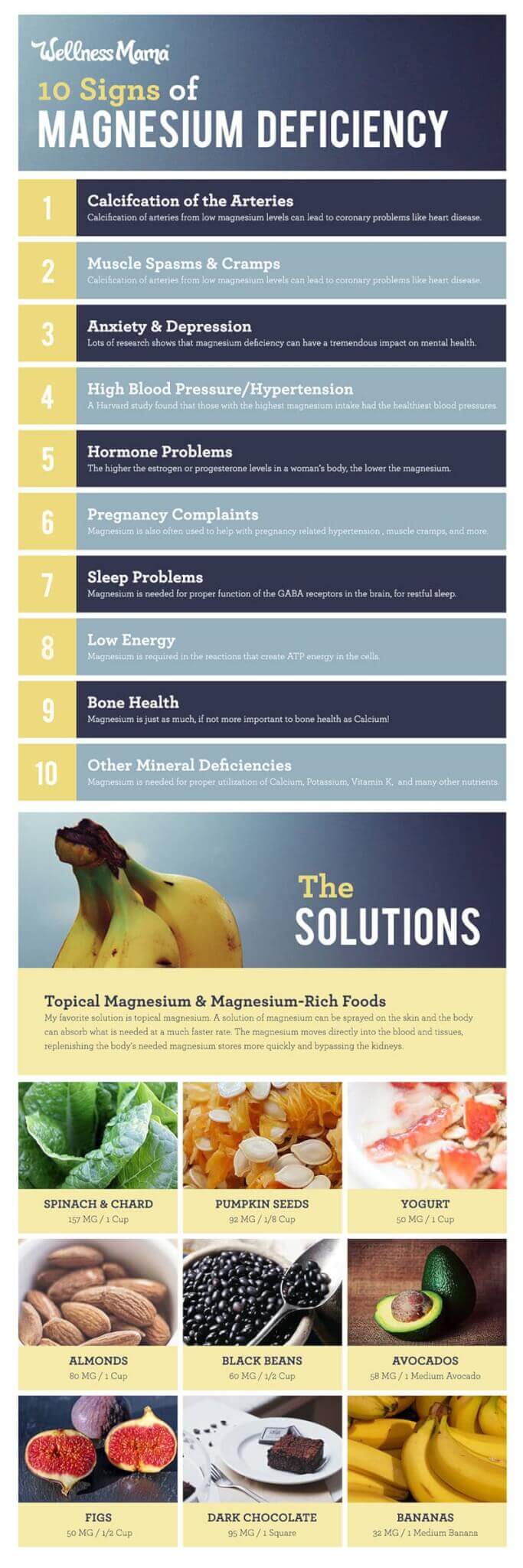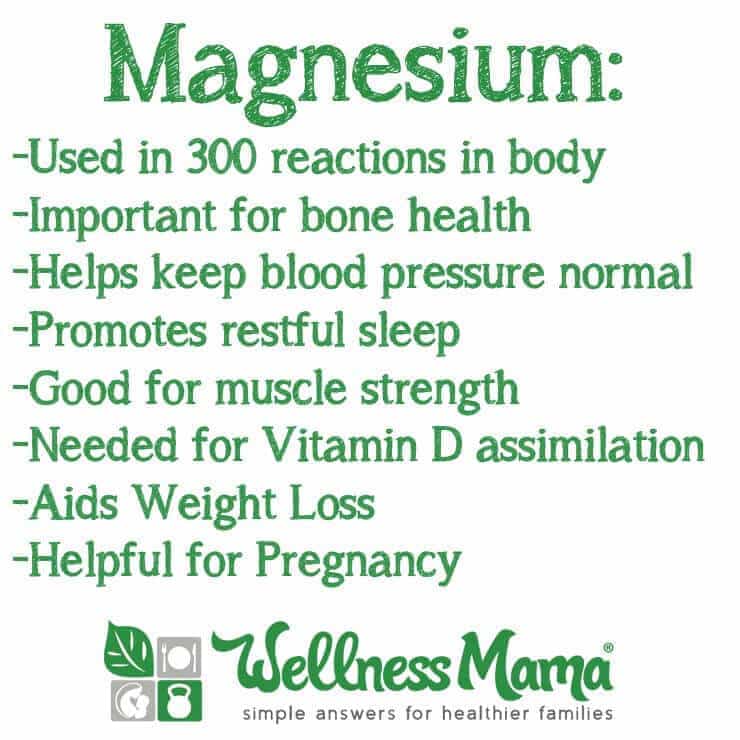The answer is likely “Yes” that you are deficient in Magnesium.
Magnesium is the eighth most abundant mineral on earth, and the third most abundant in sea water. More importantly, it is the fourth most abundant mineral in the human body and it is necessary in over 300 reactions within the body.
Magnesium isn’t just abundant in the body, but vitally important too. As this article explains:
Every single cell in the human body demands adequate magnesium to function, or it will perish. Strong bones and teeth, balanced hormones, a healthy nervous and cardiovascular system, well functioning detoxification pathways and much more depend upon cellular magnesium sufficiency. Soft tissue containing the highest concentrations of magnesium in the body include the brain and the heart—two organs that produce a large amount of electrical activity, and which can be especially vulnerable to magnesium insufficiency.
Proper magnesium ratios are important for the body to correctly use calcium in the cells. Even a small deficiency can lead to a dangerous calcium imbalance and lead to problems like calcification and cell death. This manifests itself with symptoms like heart trouble, migraine headaches, muscle cramps and premenstrual cramping.
Where Has All The Magnesium Gone?
Unfortunately, most modern farming processes tax the soil, depleting it of its natural magnesium. On top of that, many hybrids are selectively bred to survive low levels of magnesium and most conventional fertilizers use nitrogen, potassium, and phosphorus, and do nothing to replenish magnesium levels.
Water was once a good source of magnesium, but now:
Fluoride in drinking water binds with magnesium, creating a nearly insoluble mineral compound that ends up deposited in the bones, where its brittleness increases the risk of fractures. Water, in fact, could be an excellent source of magnesium—if it comes from deep wells that have magnesium at their source, or from mineral-rich glacial runoff. Urban sources of drinking water are usually from surface water, such as rivers and streams, which are low in magnesium. Even many bottled mineral waters are quite low in magnesium, or have a very high concentration of calcium, or both.
These additional dietary factors can also deplete magnesium:
- Consumption of caffeine
- Consumption of sugar (It takes 28 molecules of magnesium to metabolize a single glucose molecule! source)
- Consumption of processed food
- Consumption of alcohol
- Consumption of produce from depleted soil
- Consumption of foods high in phytic acid
Additionally, drugs like birth control pills, hypertension medicine, diuretics, insulin, and certain antibiotics (among others) deplete magnesium levels. Sweating often from exercise or other causes can also deplete magnesium.
What Does Magnesium Do?
Magnesium is necessary for hundreds of functions within the body, but is especially important for:
- Gives rigidity AND flexibility to your bones (more important than Calcium in many cases)
- Increases bioavailability of calcium
- Regulates and normalizes blood pressure
- Prevents and reverses kidney stone formation
- Promotes restful sleep
- Helps prevent congestive heart failure
- Eases muscle cramps and spasms
- Lowers serum cholesterol levels and triglycerides
- Decreases insulin resistance
- Can prevent atherosclerosis and stroke
- End cluster and migraine headaches
- Enhances circulation
- Relieves fibromyalgia and chronic pain
- Treats asthma and emphysema
- Helps make proteins
- Encourages proper elimination
- Prevents osteoporosis
- Proper Vitamin D absorption
- protection from radiation
- To aid weight loss
- Lessen or remove ADD or ADHD in children
- in proper digestion of carbohydrates
- emerging evidence is showing a preventative role in many cancers
- (source)
Even though magnesium deficiency is rarely addressed in medical settings, the National Institutes of Health website states that:
Some observational surveys have associated higher blood levels of magnesium with lower risk of coronary heart disease [50-51]. In addition, some dietary surveys have suggested that a higher magnesium intake may reduce the risk of having a stroke [52]. There is also evidence that low body stores of magnesium increase the risk of abnormal heart rhythms, which may increase the risk of complications after a heart attack [4]. These studies suggest that consuming recommended amounts of magnesium may be beneficial to the cardiovascular system.
Are You Low in Magnesium?
As I said above, the answer is likely ‘yes’ in today’s world, as over 80% of tested adults are. Unfortunately, blood tests are relatively ineffective in gauging magnesium levels as less than 1% of magnesium is in the blood.
Low magnesium levels are often diagnosed by symptoms alone, and the following symptoms can point to low magnesium levels:
- Inability to sleep or insomnia
- Irritability
- Sensitivity to noise
- Mental disturbances
- Anxiety, depression or restlessness
- Muscle soreness or spasms
- Infertility or PMS
- High levels of stress
- Headaches
- Heart “flutters” or palpitations
- Fatigue or unusual tiredness
- Coldness in extremities
- Fuzzy brain or difficulty concentrating
- Allergies and sensitivities
- Lack of appetite
- Back pain
- Body odor
- Bad short term memory
- Poor coordination
- Insulin resistance
- Carbohydrate cravings
- Constipation
- Frequent cavities or poor dental health
- Gut disorders
- Kidney stones
- Thyroid problems
If you have more than one of the above symptoms and especially if you have more than five, it is highly likely that you could benefit from magnesium supplementation.
How To Get Enough Magnesium
Unfortunately, magnesium is often not well absorbed by the digestive tract, and is even more difficult to absorb if you are deficient or are low in vitamin D, have poor gut bacteria or suffer from a number of other conditions.
On top of that, most foods are depleted of their natural magnesium levels and the water supply is lacking also. For this reason, I often use topical magnesium supplementation for our family.
There are several ways to supplement, and a mixture of more than one type of magnesium supplementation seems to be most effective. It is important to start slow and work up, as high doses will not be completely absorbed at first and most will be wasted.
Oral Magnesium Supplements
Leafy green vegetables, sea vegetables, kelp, and especially nettle are good dietary sources of magnesium, though if you have a deficiency, it will be difficult to raise your levels enough through diet alone. There is also evidence that over half of all magnesium taken internally is not used and leaves the body as waste. I take this timed release formula and B-vitamins and folate for better absorption. (I like it so much I reached out to them and they offered a 10% discount for Wellness Mama readers with the code wellness10.) Another great magnesium option is from BiOptimizers.
Transdermal Magnesium Supplements
Unlike internal doses of magnesium, topical magnesium does not have to pass through the digestive system and kidneys and can more quickly enter the blood and tissues of the body.
I now cycle a quality magnesium supplement like the one above with topical magnesium spray. I find topical to be the most effective (and cost effective!). You can make your own magnesium spray using this recipe or can try these hand-crafted jars of Magnesium Lotion as well.
Healthy Magnesium Levels: Bonus Benefit!
In fact, I was suffering from low vitamin D for years despite spending regular time in the sun and taking supplemental D3 at the suggestion of my doctor. Magnesium is needed for proper vitamin D absorption and it wasn’t until I increased my use of magnesium on my skin that my vitamin D levels finally went up.
If you’d like to learn more about the importance of magnesium and its various actions in the body, I’d suggest the book The Magnesium Miracle by Carolyn Dean as well as listen to my short podcast episode on magnesium.
Do you take magnesium? Have you noticed any benefit? Share below!



Leave a Reply